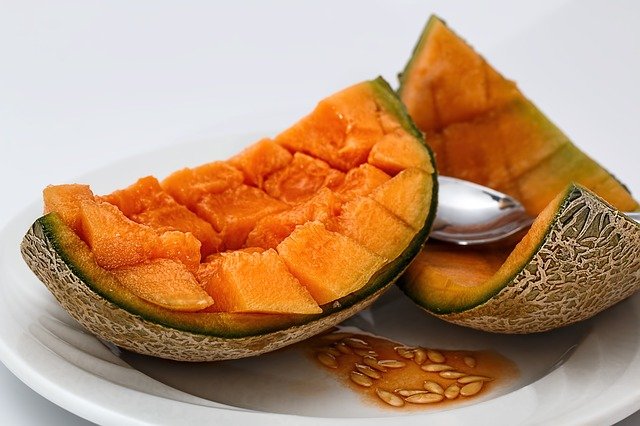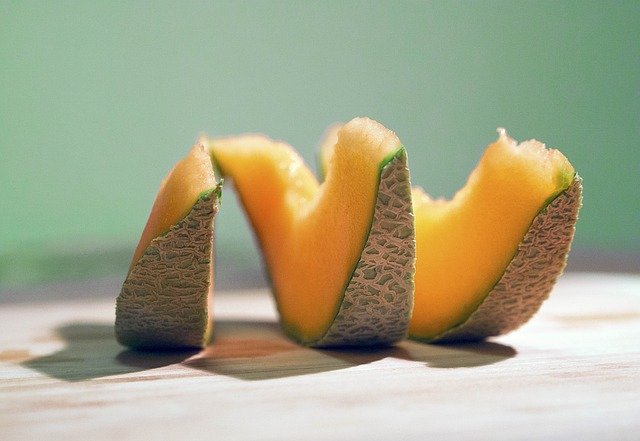Yes, lovebirds can eat cantaloupes, provided its added to balance out the diet and not the only food source. This fruit is packed full of vitamins and minerals that can be a great addition to a lovebirds diet.
Why Feed Your Lovebird Cantaloupe
It’s a change of pace from the typical mundane diet filled with pelleted seeds and water. Cantaloupes are among the most exotic fruits a lovebird can eat as they’re plenty flavourful and are beneficial to the diet as opposed to fattening as some other food sources would and it’s also not overly acidic like tomatoes which would normally cause bowel issues.
Due to a cantaloupes natural sweetness, it could even act a treat of sorts, especially if your lovebird takes a liking to it. After all, just like we have foods we do and don’t like, lovebirds can be opinionated too.
Benefit Of Feeding Lovebirds Cantaloupe
Cantaloupes are jam packed with vitamins and minerals, a lot of which are very helpful in keeping lovebirds chirpy and healthy.
Benefits Of The Vitamins
Cantaloupes comes packed with a variety of vitamins helpful in maintaining their health . The vitamins you can find in this fruit includes:
- Vitamin K – provides benefits with clotting mechanisms and also has a protective effect against coccidiosis which will prevent internal and external haemorrhaging and blood spot in eggs.
- Vitamin A – This vitamin is most well know for protecting the light sensitive pigment in the retina of the eye. It’s also beneficial for the immune production, cell recognition and cell function.
- Vitamin C – This vitamin is the most prominent within cantaloupes. it helps with the healing process, maintaining a healthy respitory system, allows the kidney’s to be in tip top shape, it’s a cancer preventative and overall is just great for these little avians health.
- Vitamin E – This vitamin is great for offspring as it enhances the chances of fertility for lovebirds. It’s also great for muscular activity, tissue integrity, immune response and the nervous systems making it an essential vitamin for a lovebirds overall growth.
- Vitamin B6 – This vitamin is extremely helpful when lovebirds molt and need to regrow their feathers. it simply allows for a healthy reproduction of feathers and decreases stress levels when in the regrowth phase.
Benefits Of The Minerals
A lot of trace minerals beneficial to a lovebirds health are found within cantaloupes. These include the below:
- Calcium – Great for healthy bone growth and production of eggshells when or if your lovebird starts laying eggs.
- Potassium – It regulates the heartbeat, ensures proper function of the muscles and nerves, which is vital for protein synthetization and metabolising carbs.
- Manganese – This mineral is involved in a lovebirds growth, reproduction, metabolism and clotting.
- Magnesium – This mineral ensures brain, nerve, digestive and reproductive system all stay in good health.
Other less prevalent but still present minerals within a Cantaloupe include the following:
- Zinc
- Copper
- Iron
- Niacin
- Choline
- Phosphorus
- Selenium
Other Benefits
Cantaloupes also come packed with protein, pectin and fiber which help to keep these little parrots strong whilst preserving a healthy digestive system to take in all these unique food sources without bloating these little birds too much.
Sugar and the fruit being 90% water will keep your lovebird both energised and hydrated, something that may be necessary to keep these parrots going throughout the day.
It also has a low glycemic load score of 4 as a result of the high water content which in turn means a lovebird will digest these sweet delectables slowly. As a result say your feathered buddy was diabetic, this slower digestion rate would mean the birds blood sugar would not spike quickly and in turn would make it safer to eat.
Negatives Of Feeding Lovebirds Cantaloupe
Cantaloupes are filled with sugar therefore, feeding these little birds too much could suddenly show are sharp increase in the weight side of things.
Furthermore, although water based foods are good for hydration, too much can cause bowel movements your lovebird probably does not want to deal with.
As a whole there isn’t too much that would have negative ramifications on your little bird provided the portions sizes are not too overboard.
When Can You Feed Lovebirds Cantaloupe?
These sweet and low carb fruits realistically can b fed to lovebirds sporadically, maybe 2 – 3 times a week as a treat to mix up the mundane diet of lovebirds.
Although technically speaking you can feed lovebirds cantaloupes whenever you want to.
How Much Cantaloupe Should You Feed Lovebirds?

You shouldn’t feed lovebirds too much cantaloupe, it should be around 1 teaspoon at first and a little more if you want to. The amount you feed should be based on the lovebirds weight and size.
When we break down the diet patterns, lovebirds tend to consume only 15% of their body weight where approximately 60-80% of all food eaten should be pelleted or complete food, whilst the remainder can be made up of sprouting seeds, fruits, nuts, vegetables among other treats.
If say on average lovebirds are 50 grams, you could technically feed it upto 2 – 3 grams of cantaloupe although it’s better for to be less than due to high concentration of sugar.
Summary
Cantaloupes are a great addition to a lovebirds diet as it’ll be a nutritious, flavourful alternative to simply eating seeds, vegetables and the more bland foods.
it’s also not acidic like other fruits making far better for these little parrots stomachs.
Therefore, if you decide to chow down on a cantaloupe slice and want your little feathered buddy to chow down on a tasty snack, a teaspoon worth of cantaloupe would make their day all the more sweeter.
References
https://www.webmd.com/food-recipes/cantaloupe-health-benefits
Amhil Khan, a dedicated nature enthusiast and the founder of BirdsOfTheWild.com, is a passionate advocate for the captivating world of avian wonders. With a deep-seated curiosity about the intricate lives of birds, Amhil’s journey began as a fascination and has evolved into a mission to inspire others to appreciate and protect these magnificent creatures.
Amhil’s love for birds led to the creation of Birds of the Wild, a platform where his expertise in ornithology, coupled with his captivating storytelling, provides readers with an immersive and educational experience. Through his lens and words, he captures the essence of birds in their natural habitats, offering a glimpse into their behaviors, migrations, and the ecosystems they inhabit.

